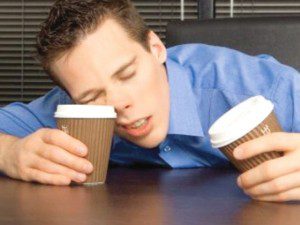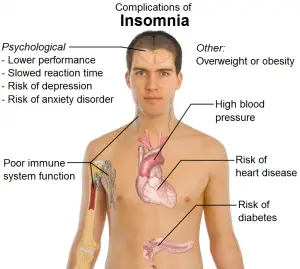By Sarah Landrum
http://www.wakingtimes.com/2015/04/24/your-brain-on-caffeine/

You know who you are. You start every morning with a nice, hot cup of coffee, and if you don’t have it, well, the day just doesn’t start. Maybe you’ve tried to quit before and couldn’t take the withdrawal symptoms, or maybe you just missed the taste too much to let it go. Maybe you insist there’s nothing wrong with a little coffee addiction and stick to your routine like it’s as important to life as breathing. You’re not alone – 80 percent of adults say they drink coffee every day, according to the FDA – but does that necessarily mean that your coffee addiction is harmless?
Not really. While coffee is certainly less destructive than other drugs, here are some of the extra, but still natural, chemicals that coffee creates in your body once its caffeine enters your brain:
Caffeine doesn’t energize you. Its molecular structure is so close to that of adenosine, a chemical that tells your body when it’s tired, that it can just blocks your brain’s adenosine receptors. This prevents adenosine from binding with those receptors and actually making you tired.
All that adenosine that now has nowhere to go prompts your body to start making more adrenaline, which further boosts your energy but can cause sweaty palms and jitteriness if there’s too much for your body to handle.
Speaking of feel-good chemicals, the dopamine your body naturally produces starts working a little bit better, meaning that you feel a little bit happier with each cup – up to four, that is. Research suggests that past that, you don’t get much more of a boost.
How Caffeine Addiction Happens
How does this make you addicted? It’s not just that the effects of coffee only last for about four to six hours. Those new or super-powered chemicals also interact with the rest of your body so much that they can actually change its makeup.
Most notably, your brain makes more and more adenosine receptors to balance out the ones that caffeine is constantly blocking. This is why coffee drinkers eventually need more than just one cup to feel awake. There are just too many receptors to plug, which means that they need more caffeine, dopamine and adrenaline to actually feel awake.
Your brain, then, is so used to operating a certain way – with more adenosine receptors than necessary and filled with caffeine instead – that quitting or just not having a cup on a certain day confuses it and leads to headaches.
Extra dopamine also contributes to the addiction. It’s the same chemical that harder drugs produce in your body to make you feel happier, too. Cocaine, for example, produces dopamine and prevents it from being absorbed. When your brain doesn’t get its fix, it leads to irritability and bad moods.
Caffeine has a different effect on every body, and can even affect you differently if you’re a woman at a certain point in her cycle or a smoker. Quitting is no different, and the good news is that if you can bear the headaches for a week or two, your brain will eventually get rid of the extra receptors and end the addiction.
Here are some of the other withdrawal symptoms you might experience, which are similar to withdrawals from any drug but not nearly as destructive (in case you haven’t experienced them for yourself):
Headaches and sleepiness due to increased adenosine receptors
Bad moods due to lack of dopamine
Problems focusing due to a decreased level of caffeine
Anxiety or jitteriness
You can minimize these effects by gradually cutting back your caffeine intake over the course of a few weeks, but that may not be necessary. While too much coffee can negatively impact your sleep patterns or blood pressure, a cup a day won’t harm you if you’re otherwise healthy. After a week or so, you may realize that you don’t need it after all.
"According to the “Fair Use” clause of International Copyright Law, the authors declare that the use of the photos, videos and information in this academic research are analyzed for purposes of “criticism, comment, news reporting, teaching, scholarship, or research” according to Section 107 of Title 17 of the US Code
Don’t Get Enough Sleep? How Caffeine Affects the Poor Sleep Cycle

By Jacob Schar
To sleep or not to sleep, that is the question!
If the “continuum ideology” of sleep is true, this means that 0-6 hours is insufficient while 7-9 hours is ample sleep to be fully functional throughout one’s day. Though it may be a hasty generalization, it’s clear that many people fall short in reaching an appropriate amount of sleep on a regular basis.
Without sleep one can not only experience short-term cognitive impairments, rather sleep deprivation also puts one at risk for more serious, long term physical illnesses.
In a study published in the National Institute of Health, authors noted a blatant dysfunctioning of “attention and working memory… long-term memory and decision-making” in those who experience sleep deprivation.
Surprise! Lack of sleep equals lack of attention, who knew? This should come as no shock, although to speak as a member of the sleep-deprived population, we often do not see the long-term consequences of our patterns and actions. Personally speaking, coffee might as well be replaced for the water in the water fountain where I study at Binghamton University!
Caffeine and the Sleep Cycle
There are health consequences associated with constant coffee ingestion. Coffee is high in the stimulant caffeine, which is known to increases heart rate, blood pressure, and if drinking too close to bedtime, it can disrupt one’s sleep patterns. The half life of caffeine (the time it takes for the body to eliminate half of the caffeine ingested) is approximately 5 hours.
As I see it, drinking coffee creates a compensating feedback loop something like this:
People stay up too late and need to drink coffee to compensate for lack of sleep the next day. In turn, the coffee ingested during the day to ‘stay awake’ furthers this sleep dysfunction. The result? Coffee becomes somewhat of a crutch and a hindrance to one’s daily sleep habits, in effect becoming a cause and a perceived ‘solution’ to our sleeplessness.
 Therefore, the fact that coffee may perpetuate sleep difficulties should not go unnoticed or ignored by those suffering from sleep deprivation, because the consequence of this perpetual cycle of disturbed sleep can create metastatic behaviour, resulting in potential long-term health problems.
Therefore, the fact that coffee may perpetuate sleep difficulties should not go unnoticed or ignored by those suffering from sleep deprivation, because the consequence of this perpetual cycle of disturbed sleep can create metastatic behaviour, resulting in potential long-term health problems.
read more @http://wakeup-world.com/2015/04/29/dont-get-enough-sleep-how-caffeine-affects-the-poor-sleep-cycle/
You need to be a member of Ashtar Command - Spiritual Community to add comments!



Replies
No I need it lol all pleasures are being taken away and my tea time take it away is sacrilege lol
There's no such thing as "coffee in moderation". Coffe is basically equivalent to "legal cocaine". If you take it, you're a druggie, no matter what the legal status says about it. ;)
Yup, I'm addicted to caffeine. I take it in No-Doz pills. If I don't take it, I get a headache.
That headache of yours is a direct result of your caffeine intake. If you quit now, the headache will be gone in 3 days.
Only three days? Thanks.
Sky I do go to Starbucks because there are some pretty ladies working there and I made friends with most. I do not drink coffee but I order Chai Tea but because I found out that Starbucks Teas contain pesticides I throw their tea bags in the bin and I take out from my pocket Yogi Black Chai tea bags and use them instead as they are excellent and make a nice cuppa and then I log into ACC
Sky please try the Pukka Herbs range of teas ...I work for them in my spare time and I know the Manager very well ...I meet him recently at the Natural And Organic Show at ExCel London.
Try Pukka Herbs Teas @ http://www.pukkaherbs.com
Those who drink Coffee need to be careful ...even those who drink second hand coffee that is the ones who work in Coffee joints are daily smelling coffee which is surely effecting their health in the long run
I can assure you that smelling coffee will have no effect whatsoever on your brain chemistry.